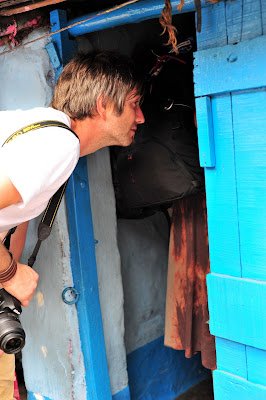
What I mean by the not so faint of heart is that this blog is lengthy. So, please, my dear Siestas, don’t get ticked at me and tell me how long it is. If you aren’t interested in reading a long post, just skip to the latter half of the blog and you’ll get the basic drift. I just got my April 2009 Christianity Today in the mail and the title “He Talked to Us on the Road: The Surprising Rewards of Christian Travel” (written by Ted Olsen) immediately caught my eye. Let me tell you, Ted Olsen works it in this staunch article. He had my mind going about a million different directions.
The beginning of the cover story begins with a quote by Martin Luther in the year 1520 “All pilgrimages should be done away with…For there is no good in them, no commandment, but countless causes of sin and of contempt of God’s commandments. These pilgrimages are the reason for there being so many beggars, who commit numberless villainies.” (qtd. on page 23). In typical Luther fashion, he states his opinion in the most absolute form possible, but it is significant that he relents a little bit by then going on to say, as Olsen points out: “I say this not because pilgrimages are bad but because they are ill-advised at the time” (24).
Just in case you are type-a… Dictionary.com (since we are all about the world wide web in the blogsphere) defines a pilgrimage as “a journey, especially a long one, made to some sacred place as an act of religious devotion”.
So far, we are here: Luther says there is nothing good in a pilgrimage, not because a pilgrimage is in itself a bad thing, but because within his own historical context they were more than unhelpful, for they even led some to sin. I just want to get off track and paint a picture for you a little bit- Luther was faced with serious stuff. For instance, he was dealing with the likes of Johann Tetzel who was arguably the most “brilliant” seller of indulgences. Some might argue that he would fit quite well in our modern-day American economic system. Tetzel had systematic programs to lure people into buying indulgences and these programs often incorporated relics- for example, the bones of various saints or martyrs. These relics were collected and believed by the masses to be salvifically efficacious- like they could release souls from purgatory, or at least limit the horrific sentence. Carter Lindberg in The European Reformations, explains well how serious the situation was in Luther’s time: “The very effort of late medieval theology and pastoral practice to provide security only led an insecure world to more insecurity and uncertainty about salvation…The Christian’s life of pilgrimage toward the heavenly city was increasingly perceived, literally and not just theologically, as an economy of salvation…This theology, however, enhanced the crisis because it threw people back upon their own resources. That is, no matter how grace-assisted their good works, the burden of proof for these works feel back upon the performers, the more sensitive of whom began asking how they could know if they had done their best” (Lindberg, 60). I think Lindberg paints the picture well. Let me summarize this: Common folk, like you and me, who knew how jacked up they really were began to feel relieved that someone out there could help them on what seemed to be an impossibly harsh spiritual quest. So when Tetzel and others like him would offer the means of salvation through various relics, they were overwhelmingly grateful.
Martin Luther who was a professor in Wittenberg went to a church whose Prince (Frederick the Wise) had gathered within it one of the largest relic collections in the area, supposedly 19,000 pieces- for example, there were apparently pieces of the burning bush… milk from Mary (um…that is so so gross)… all the way to a piece from Jesus’ very crib (see Carter Lindberg, The European Reformations, 61). Interestingly enough, Prince Frederick the Wise forbid Johann Tetzel to enter Wittenberg with all of his relics and indulgences because Frederick with his own tail on the line “did not want competition for his own relic collection with its associated indulgences” (The European Reformations, 75). But, the really astonishing part is that “Luther’s parishioners overcame this inconvenience by going out to Tetzel” (Lindberg, 75).
Well, of course, Luther was horrified when his parishioners returned and said they no longer needed confession, penance, and the mass because now they had tickets to heaven (Lindberg, 75). Now, this is a serious pastoral dilemma. Especially if you’re one of the few people in the world at the time who could actually read Greek and Hebrew, and therefore knew these behaviors were out of the bounds of Scripture. What was all the more sickening was that most of the people who bought these indulgences were peasants who didn’t have the money to spare in the first place. These supposed tickets to heaven often took advantage of the poorest. At the end of the day, Luther simply despised the thought of a person trying to attain salvation through various human strategies- whether these strategies were pilgrimages, indulgences, etc. So you get the point…Luther was obviously justified in his day for being opposed to pilgrimage…but now I am being redundant and annoying.
But now back to the article in Christianity Today– Olsen switches the focus from Luther’s own historical situation to our modern horizon. He says simply but powerfully, “The time has changed.” So often we have a hard time understanding that what is right for one generation of Christians may not necessarily be right for another. For example, the earliest Christians worshipped in the Synagogue. But, that doesn’t mean that we should leave our churches and head to our local synagogues. In the same vein, what was right for the peasants in Wittenberg is not necessarily right for all of us, because, as Olsen said, the time has changed. I think this is why Jesus sent the Holy Spirit to guide us in wisdom and knowledge. But moving right along. Olsen quotes Luther scholar Graham Tomlin saying, “It’s been possible after several centuries to disentangle pilgrimage from the works righteousness that Luther so disapproved of, so that now Protestants can go on pilgrimages –though most often, they don’t call them that- without any sense that they are earning God’s favor for doing so,” (24). Graham Tomlin (not Chris Tomlin!) says that for most people, the pilgrimages are like study tours or holidays with a spiritual dimension (24). But pilgrims are not mere ‘tourists’ but set off with the intention to experience the divine. And I LOVE what Olsen goes on to say: “Fewer pilgrims today travel in order to escape punishment for their sins, but the temptation to spiritual pride on such journey is strong as ever. Religious travel has thrown a kind of spiritual trump card on the table. An eagerness for such distinction misses how manufactured the quest for “authentic” spiritual experience on the road can be, or how transformative an organized excursion can become” (25).
Have you ever noticed this phenomenon? It’s like in the movie Mona Lisa Smile when they are horrified that Julia Roberts’ character claims to be a professor of art even though she has never seen the Sistine Chapel. We see this often in our own worlds as well- if a Christian hasn’t been to Jerusalem then he or she has a two-dimensional vision of the biblical text while those who have had this privilege may as well be wearing three-dimensional Scripture goggles. I wish they could just bring us all a pair home, ya know? It would be a heck of a lot cheaper. Well, even though this appears to be an annoying contemporary struggle we sometimes encounter…it shouldn’t keep us from setting out on ‘pilgrimage’, for as Olsen says, “We are not just minds created to soak up knowledge. We are bodies that stand in one place at a time, seeing and feeling our surroundings” (26).
This article bring us the best of both worlds, for it elevates the significance and rewards of Christian travel while also stressing the importance of our homes and local churches, which are equally as holy. Graham Tomlin says: “Pilgrimages, just like Christian conferences, can also lead to disparagement of the local in favor of the big and global. But if they lead to rediscovery of Jesus, the incarnate Word, they can lead to a renewed appreciation of the ordinary people and places that make up real live churches. At least, well-led pilgrimages, and conferences can do that” (29). I just love that. Believe me, I am a huge conference fan. I have been to Moody’s Founder’s Week conferences, Passion conferences and even Living Proof Live conferences and gone out with revitalized energy for God more times than I can count. There is just something so wonderfully overwhelming about worshipping with a vast gathering of believers. I think that is the point- conferences are great when they stimulate fresh passion for Christ and then cause us each to go back to our local communities and churches with a renewed fervor but NOT when they make us unhappy and dissatisfied with our local churches. The same goes for pilgrimages. We don’t go to the island of Patmos to see where John penned the book of Revelation to get a spiritual fix so that we come back home where we are bored with our little town and church up the road. We go for a unique spiritual experience that will enhance the life and community to which we are journeying back.
Olsen’s essay goes out with a serious bang, for he says: “Those who best journey today may not be those who are talking about their trips to Jerusalem, or to Iona, or to Santiago…They are probably those who talk about living and ministering in Overland Park or Beacon Hill. Those who are thinking about the space they inhabit as holy land. Those who have returned from Emmaus and understand that God doesn’t only meet us on the road. Theirs is the God who said, “I will make my dwelling among them and walk among them.” A God who travels. And a God who dwells. A God who has made the whole world his holy land because he has made his people a holy people.” (29)
One of the reasons this article resonated with me is because I went on a spiritual pilgrimage the summer of 2004 when I was at Moody Bible Institute (which we indeed called a “study tour”) with the aim of tracing the European Reformers. It was life changing for me. We studied the English Reformation in England, the German/Lutheran Reformation in Wittenberg, Calvin’s Reformation in Geneva, and the Swiss Reformation begun by Zwingli in Zurich and the Anabaptist Reformations thereafter, and then we ended with the Catholic Counter-Reformation taught straight from Vatican Square. That trip was supposed to be all about me learning about church history- and I did- but more significantly, it was during that trip that I felt turmoil in my heart over a relationship I was in. An engagement, actually. Surely enough, we broke up the day I returned from the trip. I had barely even gotten off the plane. The Lord, rich in mercy, and slowly but surely, through several various awe-inspiring moments during the course of that trip, planted courage in my heart to prepare mentally for the end of a relationship that I knew was going to be one of the most excruciating emotional seasons of my life.
Another equally life-changing moment for me on that trip took place in a little church outside of Berlin. A small church was hosting us for a few days before we traveled elsewhere and we stayed right there on the church property. And when I say small, I mean, like I think there were thirty to fifty people in the church. The church in Germany, at least generally speaking, is persecuted socially. Not physically, buy socially. Christians really aren’t super cool in Germany. Kids apparently don’t sport the WWJD bracelets there in hopes to obtain positive attention. The particular church we were staying with was struggling emotionally and financially but they showed us hospitality that I have rarely experienced in the States. They invited us to join in a worship service with them and I will never forget one of the songs that we sang. It was “Shine, Jesus, Shine” by Graham Kendrick. You’ve probably heard it before. The chorus goes like this:
Shine, Jesus, shine
Fill this land with the Father’s glory
Blaze, Spirit, blaze
Set our hearts on fire
Flow, river, flow
Flood the nations with grace and mercy
Send forth your word
Lord, and let there be light.
And I sat weeping in the back of the church. That little church sang that song like the eschaton was coming the very next day. Like the time was really near. It was just so pure and urgent. And I couldn’t stop crying. I had to excuse myself. I’ve only ever told one person this story. But here I am on a blog, about to tell all of you. This is why- because a small group of us snobby students, the intellectual types who would actually pay gobs of money to trace the European Reformations during our summer break, had just been mocking this very song a few days before. I am not exaggerating any of this; we were mocking that very song “Shine, Jesus, Shine” by Graham Kendrick. We were making comments about the lack of substance in the song and how catchy it was, and I don’t mean in a good way. I mean in a bad and processed cheese kind of way. Why? Because apparently we thought we were the sophisticated intellectual types with ears fit only for the lofty hymns and complex choral traditions that flow out of the hallowed halls of Westminster Cathedral. I mean we had in fact sat in on Evensong at that stately cathedral just days before, but never mind that most of us were well under twenty-two years old and had zero idea what were talking about, right?
Let me tell you. That song, “Shine, Jesus, Shine” brings tears to my eyes and chills up my spine every single time I hear it. That little church in Germany meant what they were singing. They needed Jesus to shine in their land and they needed the Spirit to blaze and at that moment that little church in Germany spoke louder to me than all the other enormous world-renowned churches that we had visited. I had spoken careless words and engaged in pompous banter and the Lord kindly chastised this child of His in a way she would never forget. He made that ‘cheesy’ song come alive and dance with the depth and glory of a symphony. Calvin’s Church, St. Peter’s Basilica, Canterbury Cathedral, etc…well, I’m glad I saw them, but none of carved an entirely new contour on my heart like that little church outside Berlin.
Well before I say Hasta Luego, Siestas, just a couple more things:
First, check out the article by Ted Olsen in Christianity Today some time soon. Even though I didn’t attempt to summarize his article, I do admit that I did not even come close to capturing the entirety of his message. My blog is faux, so go get the real thing.
Second, I want some feedback on some of your travel experiences…is there a place where you experienced God’s presence in a unique and lasting way? A moment you have pondered in your heart until this very day? Talk to me, I want to hear about it. And if you haven’t been able to travel enough to satisfy you, where would you like to go? Is there a place with specific spiritual significance that you would like to set out…if you could?
Be blessed,
Melissa
P.S. The picture above is random, I know, but it actually really reminds me of my trip to Europe and all the amazing church art and stained glass we saw.





















































